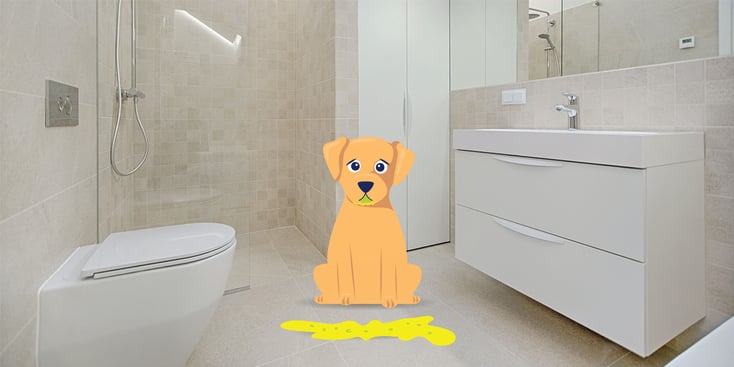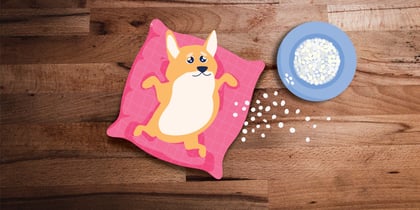Home Remedies for Vomiting Dog: A Complete Guide

Table of Contents
We have all at some point in time been woken up to the sound of our dogs heaving up their stomach contents onto the carpet. While thankfully these episodes are few and far between, if your dog is vomiting regularly, this can be indicative of a problem.
Why Do Dogs Vomit?
The vomiting reflex is a natural ingrained response of the body to protect itself from substances ingested into the gastrointestinal tract that may cause damage. Often the body will recognize the material in the stomach as ‘bad’ for example moldy food, or a toxin.
The brain receives the signals from the stomach and releases chemicals to start the process of vomiting. The same process happens if the stomach is too full, or is irritated by the contents of the stomach, for example, a build-up of acid in the stomach.
What Does ‘Normal’ Vomit Look Like?
Normal vomit usually contains a mixture of fluid such as water or yellow-green bile and food material. Your dog may also vomit up yellow foam.
If blood or dark black-brown material that looks like coffee grounds is present, this is abnormal and needs a vet visit urgently. If any non-digestible material is vomited such as parts of a dog toy, seek help as there may be more material stuck inside your dog.
Hassle-free In-Home Pet Sick Visits
When your pet isn't feeling well, the last thing you want is a stressful trip to the vet. Our in-home sick pet visits offer a calm, stress-free alternative.
What Are the Medical Treatments for Vomiting Up Bile?
Before starting treatment, it’s important to know the cause of vomiting. There are many causes of vomiting, and a veterinarian may run blood tests or an ultrasound exam to try and work out the cause.
A visit to the veterinarian will allow for a full check-up of your dog, and they will be able to tell if further testing is needed such as x-ray or blood tests to gather more information before treating your dog.
Any dehydration from vomiting can generally be treated with intravenous fluids.
Veterinarians can give injectable anti-nausea medication which is usually powerful to stop even the most severe bouts of vomiting. They may also prescribe tablet versions of this medication for you to continue using at home.
Your veterinarian may choose to dispense other supplementary medications such as probiotics and gastroprotectant medications, or a prescription diet to allow for easy digestion of nutrients.
What Are Some Home Remedies for Vomiting up Bile?
If your dog continues to vomit bile, try adjusting their diet with smaller, frequent meals, using ginger for upset stomachs, and utilizing electrolyte rehydration sachets to prevent dehydration. Here's a breakdown:
📒 Note: Before trying any home remedies for your dog's vomiting, it's always best to consult a veterinarian to ensure the most appropriate and safe approach for your pet's health.
Diet Changes
Some conditions like bilious vomiting syndrome and pancreatitis are managed with changes to your feeding schedule and if needed, the volumes of food fed at one time. Feeding small meals little and often, around four times a day with an easily digestible protein source can help the stomach to settle and reduce the chances of vomiting.
Feeding early in the morning and late at night can also reduce vomiting. This is important when considering the cause of bilious vomiting syndrome is a build-up of bile with nothing to digest in the stomach. If there is always food in the stomach or a constant trickle of food, the bile has a function throughout the day.
If the vomiting is a short-term problem, there are prescription foods such as the Royal Canin gastrointestinal diet or Hills i/d diet that can be fed to help soothe sore tummies. Another alternative, which can only be fed for a few days as it is not nutritionally balanced, is small frequent meals of chicken and rice. The gastrointestinal tract easily digests chicken and rice.
It is no longer recommended to withhold food for 24 hours (or longer) if your pet is vomiting. The gut needs a constant supply of energy from food, or it can start to die off. Continue to offer small amounts of food regularly and offer a variety of food to see if your pet prefers one option over another. Just your presence encouraging your dog to eat can be enough to get them to have a few mouthfuls of food. It is important when pets are sick that they still get nutrition into their bodies as this will speed up their recovery rate.
Ginger
Ginger is one of the best home remedies for your dog's vomiting and upset stomach. You can make ginger tea by boiling fresh ginger root in water, cooling it, and giving it to your dog in small amounts throughout the day.
Electrolytes
Electrolyte rehydration sachets are easily obtained over the counter at your veterinary clinic or local pet store. They help to prevent dehydration, which vomiting can lead to quite quickly. The dosing instructions are on the back of the packets. It is crucial to use electrolytes specifically formulated for dogs, not human preparations as the concentration of the solutions vary between species.
TLC
Dogs who are vomiting feel miserable! They need extra love and support when they are feeling unwell. Remember dogs look to us to fill their every need, and emotional support plays a huge part in recovery from illness. Wipe away any drool around their mouths after they have finished vomiting and offer a drink of fresh water regularly. Avoid walks or strenuous play as this can further upset their tummies. Offer a calm, quiet space for them to rest and recover and lots of pats never hurt!
Probiotics
Probiotics will not stop your dog from vomiting but can be a useful supplement after the vomiting bout has passed. Probiotics contain the precursors for the ‘good’ bacteria which populate the gut and help with digestion. When pets are ill with vomiting and diarrhea, they can lose some of the ‘good’ bacteria during illness.
Supplementing a probiotic can give the gut the opportunity to repopulate with ‘good’ bacteria. It’s important to use probiotic sachets or supplements specifically made for dogs as their microflora are different from other species.
Conclusion
While home remedies can provide temporary relief for a vomiting dog, they should never replace professional veterinary care. Your dog's health is of utmost importance. Don't leave their well-being to chance. Schedule a vet visit appointment today to ensure your furry friend receives the comprehensive care they deserve.
Frequently Asked Questions
I have some Metoclopramide / Ondansetron at home for my own use, can I give this to my dog?
We do not recommend using human medications on dogs without consulting a veterinarian. The dosage for people and dogs is different, and it may mask more serious problems such as an obstruction of the bowel if you treat vomiting at home with these tablets.
When should I be concerned about vomiting in my dog?
If your dog has yellow vomit or yellow foam more than 3 times in 24 hours, or more than 3 times in a week, or if there is blood or coffee grounds-like material in the vomit, veterinary help needs to be sought.
Can my dog die from vomiting?
Vomiting can cause dehydration very quickly in dogs, which can be life-threatening. Some causes of vomiting such as a stomach ulcer or a foreign body lodged in the intestinal tract can cause death if not treated. Thankfully these conditions are less common but are a good reminder that a health check with the veterinarian is always recommended if you are concerned.
Is it okay to let my dog eat the vomit again once they have vomited?
No, clean up the vomit as soon as your dog has vomited. The body chooses to get rid of this material for a reason, so if they re-ingest this, they could be consuming toxic or harmful material again. Offer your pet a small drink of water after they have vomited, but do not let them drink large volumes.
Is it ok to let my dog eat grass as a natural way to get them to vomit?
We do not advise you to let your dog eat grass as a way to induce vomiting, as too much grass can cause obstructions or impactions of the gastrointestinal tract. There are other reasons dogs will eat grass, including unbalanced diets so it can be a sign of other problems not relating to needing to vomit.





